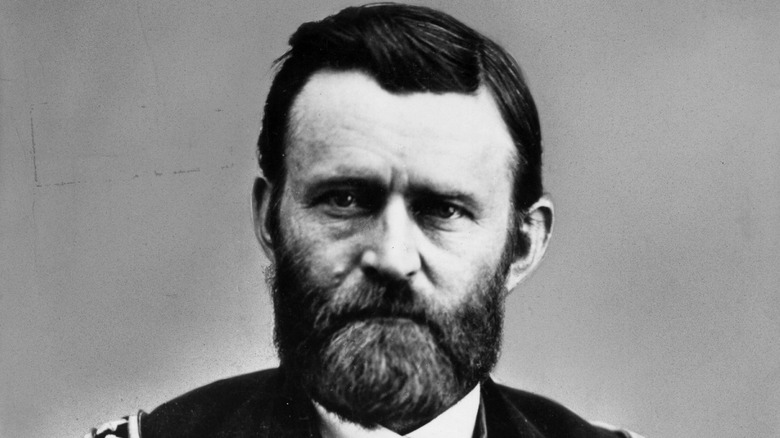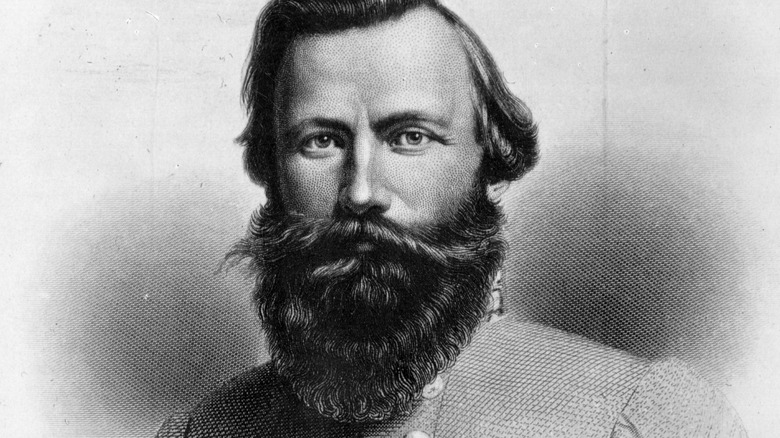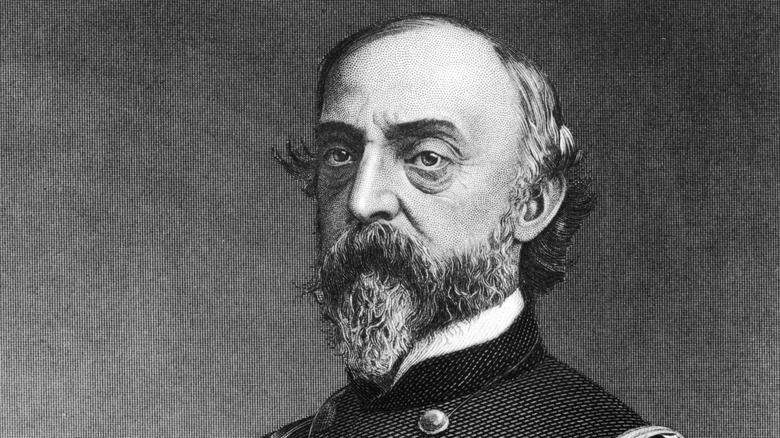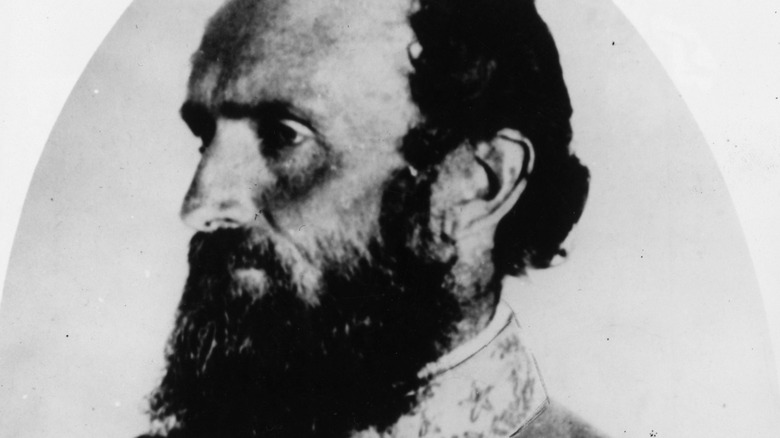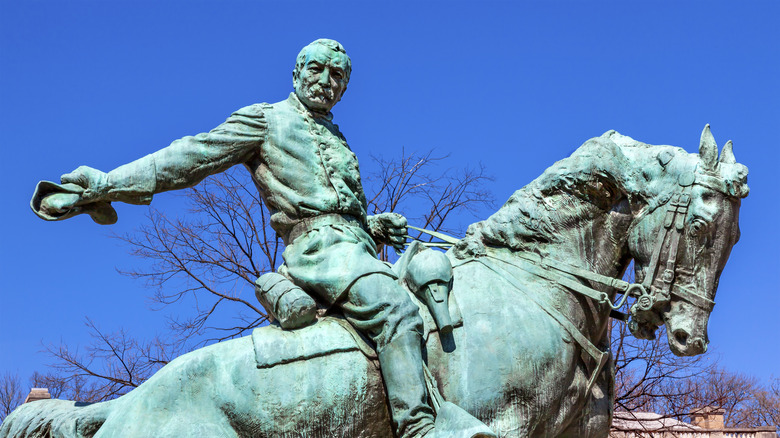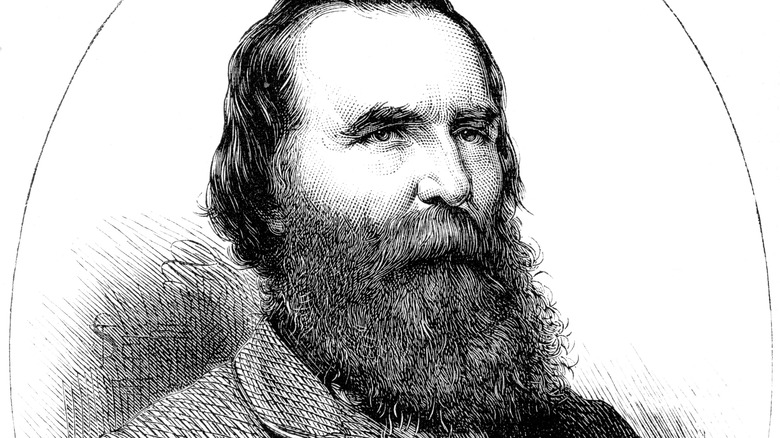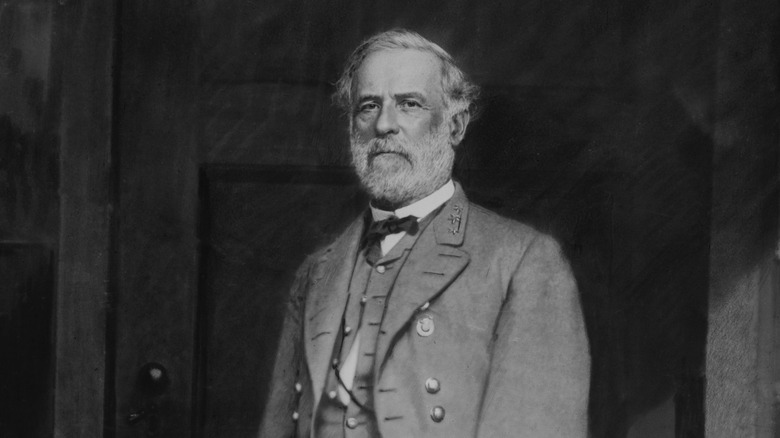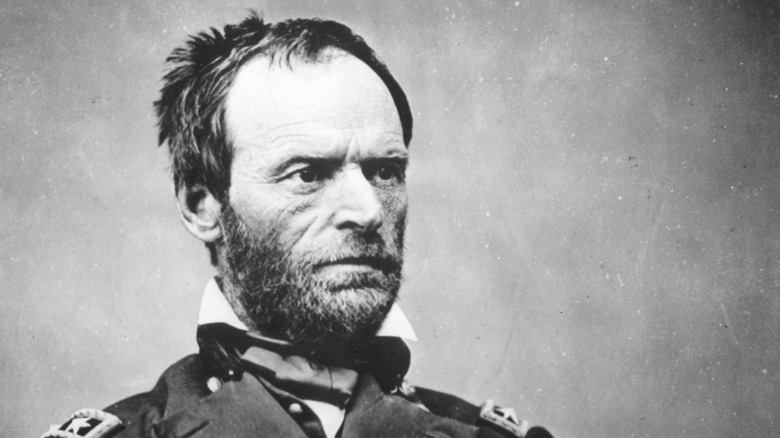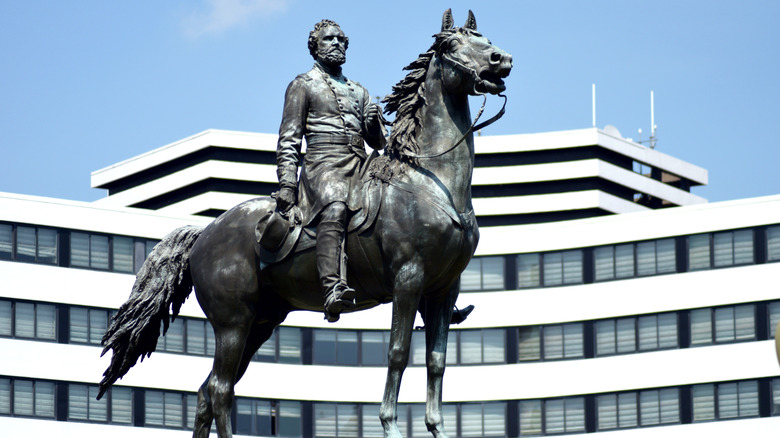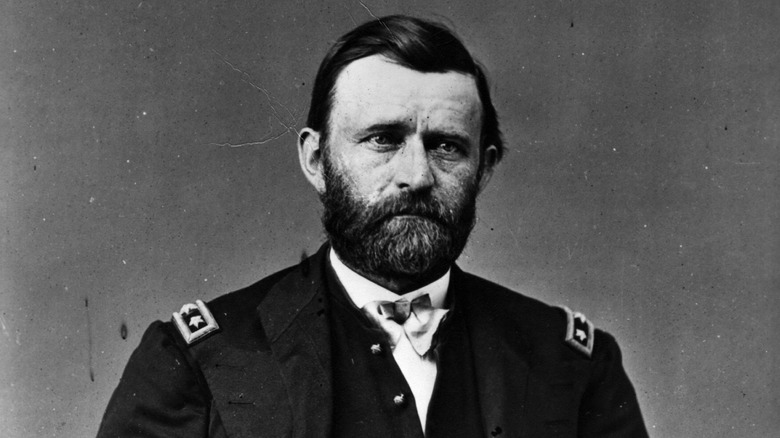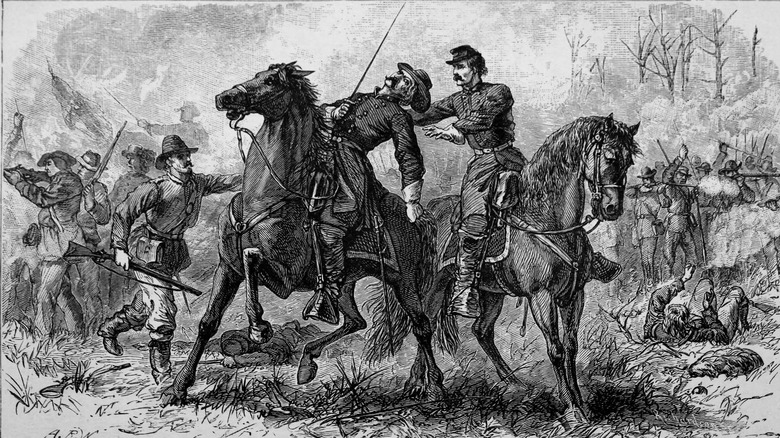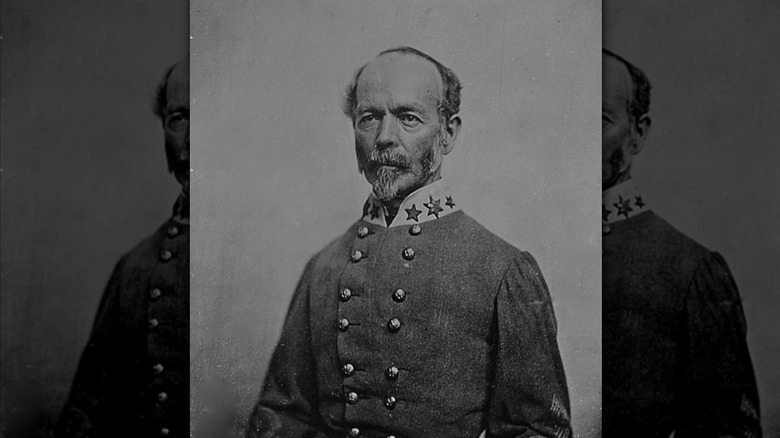Best Generals Of The American Civil War
History says that the American Civil War — the deadliest in the nation's history with more than 600,000 killed out of 2.4 million who served, not to mention countless more wounded — began with Abraham Lincoln's election in 1860. Worried the first Republican president would abolish slavery, on which the Southern economy was built, a total of 11 southern states seceded from the Union and created the Confederate States of America. They then seized Federal forts and property in their states. Lincoln responded by marching armies towards the South. The war had begun. The Confederates were heavily outnumbered and outgunned by the far wealthier North (known throughout the war as the Union), but they managed to hold on for four brutal, bloody years.
During that time, some of American history's most famous battles were fought — Shiloh, Antietam, Gettysburg, and Vicksburg, just to name a few — between armies led by some of the country's most legendary military commanders. Both sides produced their fair share of incompetent fools, but also plenty of excellent tacticians and strategists, whose feats of arms are still studied in classrooms around the world today. Here are some generals regarded by historians and civil war experts as the best or most notable of the war.
J.E.B. Stuart
James Ewell Brown Stuart, known more popularly by his initials, began working for Robert E. Lee before the Civil War even began, according to the American Battlefield Trust: The two crushed John Brown's abolitionist revolt at Harper's Ferry. When the Civil War broke out, he resigned from the U.S. army and joined the Confederacy, where he was assigned to Thomas Jackson and placed in charge of cavalry units in the Shenandoah. He and Jackson would later help defeat the Yankees at the war's first major battle: Bull Run.
Later, he and Jackson were folded into the larger Army of Northern Virginia. Under Lee, Stuart made daring raids and proved to be excellent at reconnaissance, giving Lee the information he needed to develop winning strategies at battles like Fredericksburg and Chancellorsville (where he briefly assumed command of the Second Corps after Jackson was mortally wounded).
Stuart had become a legend by 1863. But as History notes, his reputation would be tarnished during the Battle of Gettysburg. Rather than following orders to protect the army from enemy cavalry and provide Lee with crucial information, Stuart opted to go on a long, flashy raid of Union supply lines and communications. This undermined Lee, who lost the battle. Stuart would be killed by Union cavalry at Yellow Tavern in May 1864 (via NPS). His reputation was mauled, but at his best, the flamboyant Stuart was a master of reconnaissance and an excellent, well-rounded cavalry officer (via ThoughtCo).
George Meade
The American Battlefield Trust says Union Gen. George Gordon Meade started off leading Federal troops at the Seven Days Battles, Antietam, and Fredericksburg. But he's most famous for his performance at Gettysburg. Lee's great victory at Chancellorsville and subsequent second invasion of the north produced a crisis of command in the Union Army of the Potomac, when commanding Gen. Joseph Hooker resigned in disgrace on June 28, 1863. With no time to waste as rebels poured into the north, the Lincoln administration stopped asking for volunteers to replace Hooker and simply ordered Meade to do it (per Historynet).
If Robert E. Lee's Army of Northern Virginia won what was about to become the war's bloodiest, most famous battle, then the road to Washington — and a Confederate victory — would be wide open. But Meade was up to the task. According to the American Battlefield Trust, Meade wrapped his army in the shape of a fishhook around the hills south of Gettysburg itself. With superior numbers, tight interior lines, and high ground which allowed for observation of the enemy's movements, the Union beat every one of Lee's attempts to break the lines. Meade's victory wasn't brilliant, but it was enough.
He has received criticism for failing to destroy Lee after the battle, but as History notes, the Union were exhausted and likely couldn't have finished the job. Meade would spend the rest of the war answering to Ulysses Grant (via American Battlefield Trust), but he deserves credit for winning at Gettysburg.
Thomas J. 'Stonewall' Jackson
Gen. Barnard Bee might've been insulting Stonewall Jackson when he said, "There stands Jackson like a stone wall!" at the First Battle of Bull Run (no one can know for sure: Bee died later that day, per Historynet), but the term has since come to lionize Jackson. Interestingly, despite the nickname, Jackson's greatest talents were offensive, not defensive.
The Confederates won that battle. Jackson went on to lead a brilliant campaign in the Shenandoah, where his rapidly moving "foot cavalry" thwarted Union armies many times their size (per History). He then joined up with Robert E. Lee and played a huge role in the battles to come. Most notably, at Chancellorsville, Lee defied military convention by splitting his smaller force and sending Jackson's corps to outflank Union troops. Jackson routed the surprised 11th Corps. It was Lee's magnum opus, but Jackson was wounded by friendly fire later that same day. When he died days later on May 10, 1863, his reputation as a legend was already established.
However, it's possible Jackson's death was the best thing that happened to his reputation. His performances were actually hit or miss. At the Seven Days Battles, Jackson's division arrived behind schedule, jeopardizing Lee's plans (via The American Battlefield Trust). At Fredericksburg, Jackson's line nearly broke (via NPS). And although he won some flashy victories, he also got a lot of irreplaceable men killed trying to one-shot larger Union armies that always came back. Still, Jackson's brilliance in the Shenandoah and at Chancellorsville cannot be denied.
Philip Sheridan
As evidenced by his nickname, "Little Phil," Philip Sheridan wasn't an imposing guy. The American Battlefield Trust reports that Lincoln himself described the Union cavalry officer as, "a brown, chunky little chap, with a long body, short legs, not enough neck to hang him, and such long arms that if his ankles itch he can scratch them without stooping."
But Sheridan's performance would prove invaluable to the Union effort. He rose rapidly in rank, according to the article. In 1862, his performance at the Battle of Boonsville, Mississippi, impressed William Rosecrans enough that Colonel Sheridan was soon Brigadier General Sheridan. In 1863, his dashing charge at Missionary Ridge proved crucial to lifting the Confederate siege of Chattanooga, Tennessee (via Shenandoah Valley Battlefields). When Grant was appointed command of all Union armies in 1864, he left Sherman behind to oversee the Western campaign and took Sheridan with him.
Sheridan is notable for finally defeating famous Confederate cavalry Gen. J.E.B. Stuart at the Battle of Yellow Tavern (via Historynet), but his most famous campaign was in the Shenandoah Valley later that year. The National Park Service describes a repulsed 1864 attack on Washington, D.C., by Confederate Gen. Jubal Early (one of Lee's corps commanders). The Union responded by sending Sheridan to torch the Shenandoah Valley — one of the South's most vital agricultural regions. After Union troops broke through rebel lines at Petersburg, Sheridan played a major role in trapping Lee at Appomattox, forcing him to surrender and effectively ending the war.
James Longstreet
Dubbed by his boss Robert E. Lee as his "Old War-horse" (via American Heritage), James Longstreet served the Confederacy with distinction throughout the war. At the second Battle of Bull Run, Longstreet's corps swept the enemy from the field. At Antietam and Fredericksburg, his dogged defense carried the day (via History).
At Gettysburg, though, the article notes he was ripped out of his defensive comfort zone and ordered to carry out attacks he didn't believe could succeed, according to the same article. He was right: his forces failed to break through on July 2. On July 3, he was put in charge of a massive infantry assault against Cemetery Ridge. Eventually dubbed "Pickett's Charge," after the commander of one of the participating divisions, the assault became an infamous failure, just as Longstreet predicted. Later that year, Longstreet helped Braxton Bragg win the Battle of Chickamauga. His corps returned to Lee in 1864 just in time to stop a breakthrough by Ulysses. S. Grant's Union troops at the Wilderness (via American Battlefield Trust). He was wounded, but recovered in time to play a role in the defense of Petersburg in the final months of the war, before surrendering with Lee at Appomattox in 1865.
Longstreet's reputation suffered amongst his peers: Lost Causers (revisionist Confederate post-war sympathizers) hate him for eventually becoming a liberal Republican like Lincoln, and for allegedly undermining Lee with his supposedly unenthusiastic attacks at Gettysburg. In reality, Longstreet was a brilliant offensive and defensive commander, and his concerns at Gettysburg were vindicated by the result.
Robert E. Lee
Arguably the most famous general of the war, Robert E. Lee took command of the Confederate Army of Northern Virginia during the Seven Days' Battles. Britannica describes his career from there. He threw back this attack on Richmond before turning north, smashing John Pope at the Second Battle of Manassas and battling the Union to a stalemate at Antietam despite the enemy capturing his plans (via History). Then, he won the Battle of Fredericksburg and brilliantly hurled back a massive Union Army at Chancellorsville. That campaign was Lee's masterpiece, but it was also his last great victory.
Lee lost the war's bloodiest, most famous battle at Gettysburg in July 1863, before going up against Ulysses S. Grant in the Overland campaign and the Siege of Petersburg. Grant, unlike his predecessors, refused to retreat when Lee bloodied his nose. His Union army sunk its teeth into the rebels and didn't let go until Lee surrendered in spring 1865.
In its examination of Lee's true (ugly) thoughts on slavery and Black suffrage, The Atlantic notes that despite his reputation as a brilliant general, Lee was more of a solid tactitian who could win individual battles, but he unwisely fought a traditional war against a more powerful opponent when a more defensive mindset would've been better. NewsLetter brings up other good points. Lee won his greatest victories against mediocre opponents and never produced a war-winning strategy. Still, some of his victories were astonishing, and his holding on for as long as he did cannot be ignored.
William Tecumseh Sherman
William Tecumseh Sherman is a controversial figure in U.S. history. He was a huge believer in manifest destiny (the belief that white Americans were destined to conquer the west), and cruelly campaigned against native Americans in the late 19th century (per History). He's much more famous for his service in the American Civil War, however.
The Latin Library notes that Sherman suffered from extreme depression in the early years of the war, but that didn't stop him from winning some of the Union's most crucial victories. In 1864, Ulysses S. Grant was promoted to command of all Union armies (via History). He left Sherman in charge out west while he went to fight Robert E. Lee. Sherman captured Atlanta in September, after an excellent campaign in which Union forces repeatedly inflicted higher casualties than they sustained on an already-outnumbered foe. The article also attributes Abraham Lincoln's re-election to Sherman's victory that year.
After taking Atlanta, Sherman began his March to the Sea (via Britannica) by boldly disconnecting from his supply line and having his forces live off the land of rural Georgia as they carved their way to Savannah. U.S. News reports that the March is generally seen as a cruel, bloodthirsty crusade against innocent civilians. American Battlefield Trust has a different take, saying it was an innovative and relatively bloodless campaign that did exactly what it set out to do: free slaves, break the back of the Confederacy, and save lives by hastening the end of the war.
George H. Thomas
Union Gen. George H. Thomas gave the north one of its first major victory at Mill Springs (via ThoughtCo), but he first came to national attention for his defense at Chickamauga. According to The American Battlefield Trust, September 1863's Battle of Chickamauga was a major, desperately needed victory for the Confederates (after defeats at Gettysburg and Vicksburg). But it was also costly, costing the rebels 10 generals and 20% of their attacking force. It could've been much worse for Gen. William Rosecrans' Union army, too, had it not been for Thomas. History says that Thomas' corps dug in and withstood multiple attacks from the Confederates, buying time for the rest of the army to escape to Chattanooga.
The following year, Confederate Gen. John Bell Hood threatened Union communications and supply lines. Gen. William Tecumseh Sherman, not wanting to be distracted from his March to the Sea, called upon Thomas, now nicknamed the "Rock of Chickamauga," to deal with the threat (via Britannica). He did. Hood's rebels suffered massive losses at the Battle of Franklin (on November 30, 1864) and were utterly wiped out after Thomas' brilliant victory at Nashville, which ended large-scale fighting in the region for good and earned him the thanks of Congress.
Thomas was too humble to write a memoir after the war and thus rarely gets the recognition he deserves (via American Battlefield Trust). But his superiors had plenty of nice things to say (via Smithsonian). Grant called him "one of the great names of our history" while Sherman described his services as "transcendent."
Ulysses S. Grant
Future president Ulysses S. Grant started his Civil War career out west. The American Battlefield Trust says he captured Forts Henry and Donelson, earning him the nickname "Unconditional Surrender Grant," before winning at Shiloh (via NPS) and splitting the Confederacy in two during the fighting for Vicksburg (via Britannica). This campaign was his magnum opus: he used diversion to sneak his forces across the Mississippi, surprised the rebels by slashing their supply lines, and then moved on the city from the lightly defended rear. He then lifted the siege of Chattanooga months later (via History), opening the road to Sherman's capture of Atlanta. President Abraham Lincoln, impressed with Grant's spotless record thus far, gave him command of all Union armies (via History).
Grant chose to camp with the Army of the Potomac in Virginia to oversee its campaign against Robert E. Lee (via American Battlefield Trust), while his subordinates launched simultaneous assaults in other theaters to overwhelm the Confederates. Despite high casualties, this "Overland Campaign" did its job: the attritional war against Lee wore down the rebel's proudest army and then broke it at the Siege of Petersburg. He accepted Lee's surrender at Appomattox in spring 1865.
Although it's worth noting that Grant's Union army enjoyed numerical superiority (via History on the Net), that was an advantage enjoyed by his failed predecessors, too. He won because he was a brilliant strategist and tactician (via History), capable of winning battles without taking his eye off the prize: ultimate victory.
Albert Sidney Johnston
"If [Johnston] is not a general, we better give up the war, for we have no general." Thus was the esteem President Jefferson Davis had for Gen. Albert Sidney Johnston, according to Charles Roland's "Jefferson Davis' Greatest General". Johnston was one of America's ablest commanders and the natural choice to command the Confederacy's Western Department, an area centered around the Tennessee and Mississippi River valleys.
Johnston faced Gen. Ulysses Grant's army at the Battle of Shiloh, which was one of the bloodiest and costliest battles in the Civil War up to that point. Johnston massed his army of around 44,000 men at Corinth, Mississippi, and marched north to attack Grant's army at Pittsburgh Landing, Tennessee, near the Old Shiloh Church, before federal reinforcements could arrive. Johnston's daring plan called for his much smaller army to catch Union forces by surprise and drive them into the river.
Johnston's attack worked, overrunning Union advance lines and inaugurating the bloody Battle of Shiloh. But despite his success, Johnston had not expected Grant's men to fight to the death. Nevertheless, he believed the battle was winnable, inspiring his forces by putting himself at the head of the attack. As Johnston was leading a charge of reluctant Tennessee soldiers, his bold plan came crashing down when he was shot in the leg and bled to death.
Johnston's death left Gen. P.G.T. Beauregard in charge of the army. Believing he had won, Beauregard halted the Confederate attack for the night, allowing Grant's reinforcements to arrive and handing the battle to the United States. With over 10,000 casualties, the Confederate attack, which had started so promisingly, came to nothing.
Joseph E. Johnston
Gen. Joseph E. Johnston was appointed commander of the Army of Tennessee in November 1863 — a time when the Confederate cause was lost. The soldiers adored their new general. Cpl. Sam Watkins wrote in his memoir "Co. Aytch" that Johnston revamped logistics, resupplied the army, and restored order and discipline. Soldiers were expected to fight hard and obey. Those who did not were shot — but, as Watkins noted, "for the crimes [they] had done, and not to intimidate and cow the living."
Johnston's task from President Jefferson Davis was to defend Atlanta's critical war industries against Gen. William T. Sherman's advancing army. Outnumbered, Johnston opted to play defensive over 100 days of battles, fighting from strongly fortified positions and allowing Sherman to come to him. Whenever Sherman flanked the Confederate line, Johnston withdrew and began the process all over. Watkins wrote, "Every night we change our position ... The troops are in excellent spirits."
Johnston's defensive strategy was meant to overextend Sherman's supply lines and slow him down — not defeat him outright. He lacked the resources to defeat the much larger Union force and wisely realized a pitched battle would have been suicide. Davis, however, wanted Johnston to attack Sherman before he could reach Atlanta. Johnston would not, so Davis replaced him with John Bell Hood, who led the Confederates to disaster at Franklin — or as Watkins called it, the place where "The death-angel gather[ed] its last harvest."
